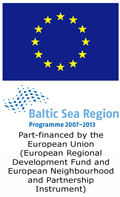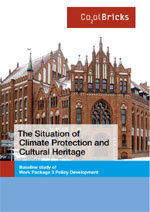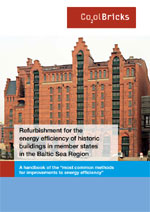10.04.2012
First two Baseline Studies published and ready to download
The first two Baseline Studies "The Situation of Climate Protection and Cultural Heritage - Baseline study of Work Package 3 Policy Development" and "Refurbishment for the energy efficiency of historic buildings in member states in the Baltic Sea Region - A handbook of the “most common methods for improvements to energy efficiency” - Baseline study of Work Package 4 Technical Innovations" are published and are available to download here:
- The Situation of Climate Protection and Cultural Heritage - Baseline study of Work Package 3 "Policy Development" - PDF, 4.3 MB
- Refurbishment for the energy efficiency of historic buildings in member states in the Baltic Sea Region - A handbook of the “most common methods for improvements to energy efficiency” - Baseline study of Work Package 4 "Technical Innovations" - PDF, 6.4 MB
The Baseline study of Co2olBricks Work Package 3 - Policy Development - is an inventory of criteria steering climate protection and cultural heritage of the participating partner countries. That is criteria such as cultural heritage- and energy legislations, building regulations, EU-directives and their national implementation plus financial mechanisms.
The results of the baseline study appoint topics and themes for expertise seminars and workshops that will analyse it and contribute with their knowledge. Adoption of the results of the baseline study and the consequences from the whole project gives strategic activities which aims at to affect implementation in national and regional development and climate protection plans, in urban development, regulations and legislations etc
The “handbook of the most common methods for improvements to energy efficiency” is the initial result of the work package 4 which gives an insight into common methods of refurbishment for the energy efficiency of historic buildings in eight participating countries of the project. It serves as an exchange for various experiences and shows the different standards in the participating countries. By referring to this handbook, the project partners can start to develop common alternative procedures for refurbishment for energy efficiency which use improved technologies or new methods.




